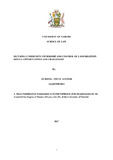Location
Our Vision is to be a world-class university committed to scholarly excellence.
Our Mission is to provide quality university education and training and to embody the aspirations of the Kenyan people and the global community through creation, preservation, integration, transmission and utilization of knowledge.
Core Values
In order to realize the above vision and mission, certain shared values shall be nurtured. There is great need for the University to be guided by the right values derived from the virtues and moral standards of the Kenyan and wider society.
Core Functions
Teaching and Learning: The university offers innovative , relevant and market driven academic programmes , both at undergraduate and postgraduate levels with inbuilt quality control systems the university also provides an environment and policy framework for undertaking high quality and relevant research
Members:
Resources
Displaying 31 - 35 of 298Exploring the Potentials of a Gis-based Street Addressing System in the Management of Land Rates. Case Study: Machakos Town
A study on street addressing system reveals that there are several benefits associated with the system. In fact, it is one of the most feasible systematic efficient approaches for managing properties and locating places. A sizeable sample of planning authorities in developed countries have applied successfully street addressing to manage cities, towns and urban areas.
A Critical Analysis of the Extent to Which the National Land Commission Addresses the Land Question in Kenya.
The land question in Kenya has never been solved. Land is a pertinent source of livelihood, the problem has persisted and in a number of years caused chaos as people grow impatient. Over time, there have been complaints from various communities and recently, the past governments have sought to listen to the ailing communities. The National Land Policy and the National Land Commission characterize efforts to remedy the continued situation bedeviling the African communities.
Securing Community Ownership and Control of Land Rightsin Kenya: Opportunities and Challenges
Ownership, use and management of land are highly emotive issues in Kenya and were one of the key drivers of the push for a new constitution. In fact going back in history, this was the main reason for the fight for independence. The general aim of the research was to show that the Kenyan people in their constituent power have perceived land as more than just property which readily converts to market value with relevant injuries being recompensed conclusively with awards of damages. The Constitution of Kenya 2010 sets out governing principles on land policy.
Effect of agricultural practices on water quality in Ndakaini Dam, gatanga, Muranga, County, Kenya
Change in Land Use and Land Cover (LULC) is inevitable and accuracy and time are important
to detect the change in different seasons to monitor trends and status of water quality.
Understanding LULC and Water Quality Parameters (WQP) is necessary for efficient water
management and reduction of operation water treatment cost. Therefore, the effect of
agricultural land uses on water quality in Ndakaini, Gatanga, Muranga County, the LULC and
WQP were analyzed using Remote Sensing (RS), Geographical Information System (GIS) and
Transcending landscapes: Working across scales and levels in pastoralist rangeland governance
Landscape approaches can be subjected to mistakenly targeting a single “best” level of governance, and paying too little attention to the role that cross-scale and cross-level interactions play in governance. In rangeland settings, resources, patterns of use of those resources, and the institutions for managing the resources exist at multiple levels and scales.






